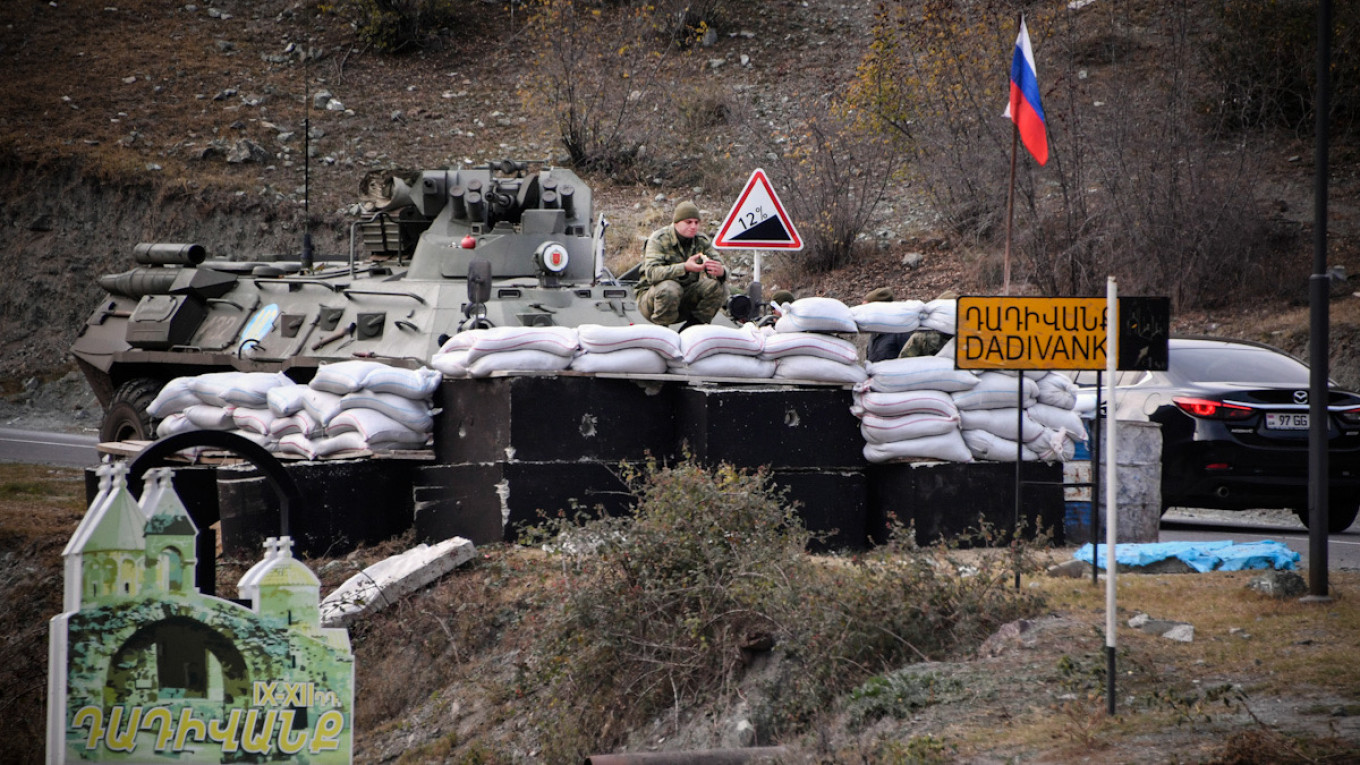Dmitri Trenin, director of the Carnegie Moscow Center, recently published his take on Russia's responses to this year’s crises in Belarus, Kyrgyzstan and Nagorno-Karabakh. Trenin infers from these responses that Russia’s national interests no longer require anchoring ex-Soviet neighbors to Moscow. Per “Moscow’s new rules,” Russia “is embracing its loneliness as a chance to start looking after its own interests and needs,” while “the countries that emerged from the ex-Soviet republics are on their own,” according to Trenin. I disagree and here’s why.
One of post-Soviet Russia’s traditionally vital interests has been to keep formerly Soviet neighbors anchored to itself while preventing the emergence or arrival of alternative regional hegemons, so that Moscow can thrive in a friendly environment.
Had that interest vanished under Putin, the Russian leader would not have supported separatism in eastern Ukraine in 2014 in hopes of enhancing leverage that could dissuade Ukraine from trying to “escape” to the West in the wake of the Revolution of Dignity.
More recently, Putin would have neither provided material support to Alexander Lukashenko’s regime nor promised to send police reinforcements to his aid if he had not believed the massive protests in Belarus could lead to the replacement of “Europe’s last dictator” with a pro-Western leader.
In contrast, Moscow chose not to intervene in yet another revolution in Kyrgyzstan, the same as with the previous two revolutions in the country, because there was no threat to the aforementioned Russian vital interest: The winner of the latest Kyrgyz revolution is as pro-Russian as his predecessor. (To be clear, I am no fan of regional hegemonies, but I accept them as part of geopolitical reality in most parts of the world, including in the post-Soviet neighborhood.)
In contrast to the crisis in Kyrgyzstan, the Nagorno-Karabakh war clearly threatened this vital Russian interest. One did not need a crystal ball to see that Ankara would significantly expand its clout in the South Caucasus if Azerbaijan defeated Armenia with Turkey’s direct military support.
As I argued in early October, such an outcome could have been avoided if Putin had employed some of the leverage that Russia has vis-à-vis its ex-Soviet neighbors and Turkey to compel the warring sides to discontinue hostilities while Armenia was still able to repel most of the offensives. (To be clear, the lack of Russia’s support was just one of multiple factors that led to Armenia’s loss. Which Armenian leadership failures and structural factors contributed is yet to be examined thoroughly and internalized.)
Had Russia successfully employed its leverage early on to stop the hostilities, it could have solidified its role as the primary arbiter and security guarantor in that part of the South Caucasus without alienating either Armenia or Azerbaijan. It would have also helped to stem attempts by Turkey, with which Russia is at odds over Syria, Libya and Crimea, to expand its influence and presence in the South Caucasus and further east to the Turkic-speaking republics of Central Asia, with which it will be able to have a shorter transportation connection thanks to the peace deal.
Obviously, Russia’s desire to maintain a constructive relationship with Turkey, which can act as a spoiler for Russia in Syria and elsewhere, may have played a role, as could a desire to create additional leverage vis-à-vis Azerbaijan in the form of a Russian peacekeeping force in Nagorno-Karabakh.
Moscow’s decision not to intervene in the conflict early also ensured that Turkey and Azerbaijan would not curtail their trade with Russia. However, I think that on balance, the expansion of Turkey’s role in the post-Soviet neighborhood and the damage done to Russia’s reputation as a military ally in the eyes of the other members of the Collective Security Treaty Organization, or CSTO, may have outweighed these benefits. After all, Russia can live with Idlib out of Assad’s control, and Russia’s exports of gas to Turkey fell by almost 70% earlier this year, with one of the two pipelines running from Russia to Turkey left idle for months. Besides, Turkey and Azerbaijan combined account for less than 5% of Russia’s trade.
Can personal animosity partly explain Putin’s response to war in Karabakh?
So, if Russia’s vital interests cannot quite explain why Putin chose not to employ Russia’s leverage to stop the Nagorno-Karabakh war early on, then what can? In the end, what tipped the balance of pros and cons of Russia’s early intervention in the war toward not intervening may have been Putin’s personal animosity toward Armenian Prime Minister Nikol Pashinyan.
Trenin claims in his article that Pashinyan’s fault in the eyes of the Russian leadership was that he pursued a “multi-vector” foreign policy, “distancing itself [Armenia] from Russia and reaching out to the West.” It is true that Pashinyan did sound pro-Western compared to his predecessors, such as Serzh Sargsyan and Robert Kocharyan, before coming to power during the revolution of 2018.
At the same time, however, Pashinyan installed Russian-educated leaders at the helm of Armenia’s defense and security agencies (even if he then fired the security chief). He also publicly assured the Russian leadership of his intention to keep Armenia fully cooperating with Russia in all formats, essentially adopting the so-called complementary approach toward foreign policy crafted by his predecessors, who were both considered pro-Russian.
Where the Armenian leader did, however, draw Putin’s ire, was in prosecuting Kocharyan, who remains Putin’s personal friend. Pashinyan repeatedly ignored Putin’s clear signals to discontinue attempts to jail Kocharyan, while also seeking to prosecute then-CSTO secretary Yuri Khachaturov, which could not have pleased Moscow either.
How lasting can damage be from Russia’s failure to intervene early in Karabakh War?
Going forward, I cannot, of course, rule out that the public discontent in Armenia over the disastrous ceasefire deal will eventually force Pashinyan out of power.
I have little doubt that such a development would please Putin. But, in my assessment, it won’t compensate for the damage that his decision not to compel the warring sides to peace early on has done to Russia’s efforts to ensure the continuous and growing involvement of its ex-Soviet neighbors in Moscow-led integration projects, such as the CSTO and the Eurasian Economic Union in the longer term.
Russia’s decision not to employ leverage to stop the conflict in its early stages made a lasting impression on its CSTO allies in what may ultimately influence their geopolitical choices in the longer term should Russia’s national power decline substantially vis-à-vis alternative “guarantors of security” in the neighborhood.
In fact, members of these organizations may already be wondering why participating in all the Kremlin-led multilateral integration initiatives in post-Soviet Eurasia, like Armenia does, does not prevent Russia from being “equidistant” to you and your adversary, even if the latter has initiated hostilities against you and, unlike you, is not Russia’s military ally. Some of these allies may also wonder what happened to the not-so-subtle threat that the Russian military base in Armenia would “enter the armed conflict if the leadership of Azerbaijan decides to use force to restore jurisdiction over Nagorno-Karabakh,” dropped by the then-commander of that base in an interview with the Russian Defense Ministry’s official daily.
Why “loneliness” could prove to be problematic for Russia
That Russia needs to continue fostering such alliances in its ex-Soviet neighborhood — contrary to Trenin’s argument in favor of “loneliness” — should be clear to anyone who attempts to match Putin’s ambitions with Russia’s capabilities.
Time and again, Putin, his ministers and Russian strategic documents have underscored Russia’s intention to continue to play a lead role in global affairs, acting as a “counterbalance in international affairs” even as the world order is changing.
To play that role in peacetime without having to “punch above its weight” all the time, Moscow needs to ensure that traditionally important components of the combined national power of Russia and its allies are significant enough for other great powers to take very seriously. That’s where alliances in the ex-Soviet neighborhood can come in handy. As I have noted earlier, if Russia were to integrate all the ex-Soviet republics — with the exception of the Baltics, Georgia and Ukraine, which are considered “lost” — into a Eurasian Union, Russia’s economic and demographic clout would increase by 32% and 69% respectively.
For Russia to maintain its role as a global player, per Putin’s vision, it needs its ex-Soviet neighbors to retain interest in its military and economic integration projects, especially as profound changes in the world order create uncertainties with regard to the future of Russia’s and other countries’ relative national power.
Russia’s response to the war in Nagorno-Karabakh has been perhaps not the best way for a great power to incentivize such interest, to put it mildly. After all, countries prefer to participate in alliances that are built on mutual respect for each other’s military and security interests of existential importance and mutual aid when these interests are threatened.
Such military and security alliances typically prove to be more lasting than those based on the premise that there is simply no alternative great power to either ally or bandwagon with, per the Russian saying “there is no running away from a submarine.”
A Message from The Moscow Times:
Dear readers,
We are facing unprecedented challenges. Russia's Prosecutor General's Office has designated The Moscow Times as an "undesirable" organization, criminalizing our work and putting our staff at risk of prosecution. This follows our earlier unjust labeling as a "foreign agent."
These actions are direct attempts to silence independent journalism in Russia. The authorities claim our work "discredits the decisions of the Russian leadership." We see things differently: we strive to provide accurate, unbiased reporting on Russia.
We, the journalists of The Moscow Times, refuse to be silenced. But to continue our work, we need your help.
Your support, no matter how small, makes a world of difference. If you can, please support us monthly starting from just $2. It's quick to set up, and every contribution makes a significant impact.
By supporting The Moscow Times, you're defending open, independent journalism in the face of repression. Thank you for standing with us.
Remind me later.








